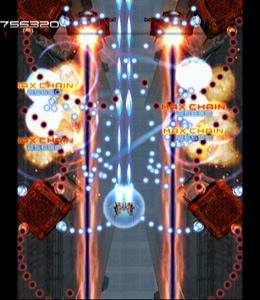Ikaruga.Respect
February 28th, 2008

As I mentioned a long time ago in this blog, I’ve been trying to branch out into more niche games. So far I’m very pleased with how I am doing and have covered a lot of ground but unfortunately I’m falling short in the shmp or shoot ’em up genre. Luckily a few weeks ago a newsletter from my favourite Anime/Games store arrived in my inbox informing me that they had a few new copies of Ikaruga for the Gamecube on sale. Being familiar with the game and it’s strong reputation I went out and snatched a copy as soon as possible.
I must say Ikaruga has answered a lot of questions for me. You see, I’ve been a part of the RacketBoy.com retro gaming community for some time now and I’ve noticed whether it be on the blog or on the forums, these guys have a profound love for Treasure, the developers behind Ikaruga.
From my experience with Treasure’s games I thought that they were quite a good developer but not on the same level that these guys were touting. As much as I did my research to try and further understand this developer I simply could not understand these guys. Which is one of the reasons why I bought Ikaruga.
It might sound greatly exaggerated but as soon as I turned on Ikaruga it all started to make sense. As I continued to experience the game’s challenging (but never impossible) levels it continued to make more sense and draw me closer into this game’s main theme. Its much like an unwritten law between gamer and developer and it really is quite profound and provocative.

I’ve continually been thinking about this aspect of Ikaruga’s game design and what makes it so brilliant. Because it wasn’t simply that I was playing the game vertically nor was it that I was fairly new to the shmp genre which made me appreciate this fine game. It is the games design, sure I am no expert on shmps but what Ikaruga does it does to perfection. At first sight it seemingly overwhelms you with an array on black and white bullets which you need to avoid or absorb depending on your ship’s state. But once you begin playing through the first level and then the second and so forth you understand that this game is not half as difficult as it looks from a distance.
With solid pattern recognition and nimble analogue stick movements Ikaruga is game which is beatable (well on a few continues at least) with dedication. If you respect Ikaruga for being the formidable challenge that it is then it will reward you for what you put in.
A lot of my feelings about Ikaruga were summarized well in The 100 Best VideoGames magazine which came out some time ago. Theres definitely a lot of mistakes in this publication such as spelling, grammar, general gaming knowledge and ridiculous game inclusions. Actually there is surprisingly amount of mistakes but there are a couple of articles which really do amplify the spirit of the game well and I think that they nailed Ikaruga’s page.
So I quote (The 100 Best VideoGames, Pg54, Derwent Howard, 2007):
“that nothing short of perfection will be rewarded. This isn’t a game in tune with other of the other current gaming buzz words – it isn’t interested in emergent gameplay, it doesn’t want to let you express yourself through customization, or tailor the experience to match your preferences. Ikaruga is a gauntlet, thrown down by four men you’ll likely never meet but whose intention you understand perfectly. The challenge may be steep, but somehow the game never demoralizes. There is never a sense that its designers wanted to get one up on you. Instead, throughout the crushing defeats and the slow ascent from C+ to B to B++, there’s the sense that the challenge is as tough as it is because the designers have too much respect for you. They believe you to be equal to the task, and so failing at the game becomes failing to them as well as yourself.”
So as you can probably tell, I love Ikaruga. The experience is remotely different from anything before it is a simple game just like other games that fall under one of gaming’s oldest genres; the shoot em up



 Game Design Companion: A Critical Analysis of Wario Land 4 - $7.99
Game Design Companion: A Critical Analysis of Wario Land 4 - $7.99 Level Design: Processes and Experiences
Level Design: Processes and Experiences Speed Boost: The Hidden Secrets Behind Arcade Racing Design - $5.99
Speed Boost: The Hidden Secrets Behind Arcade Racing Design - $5.99 Adventures in Games Analysis: Volume I - $5.99
Adventures in Games Analysis: Volume I - $5.99







